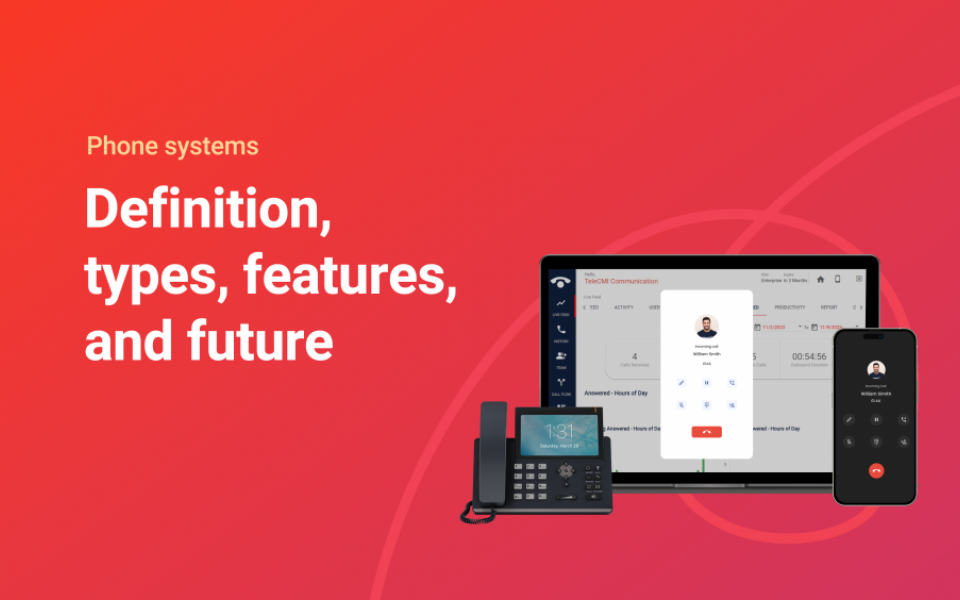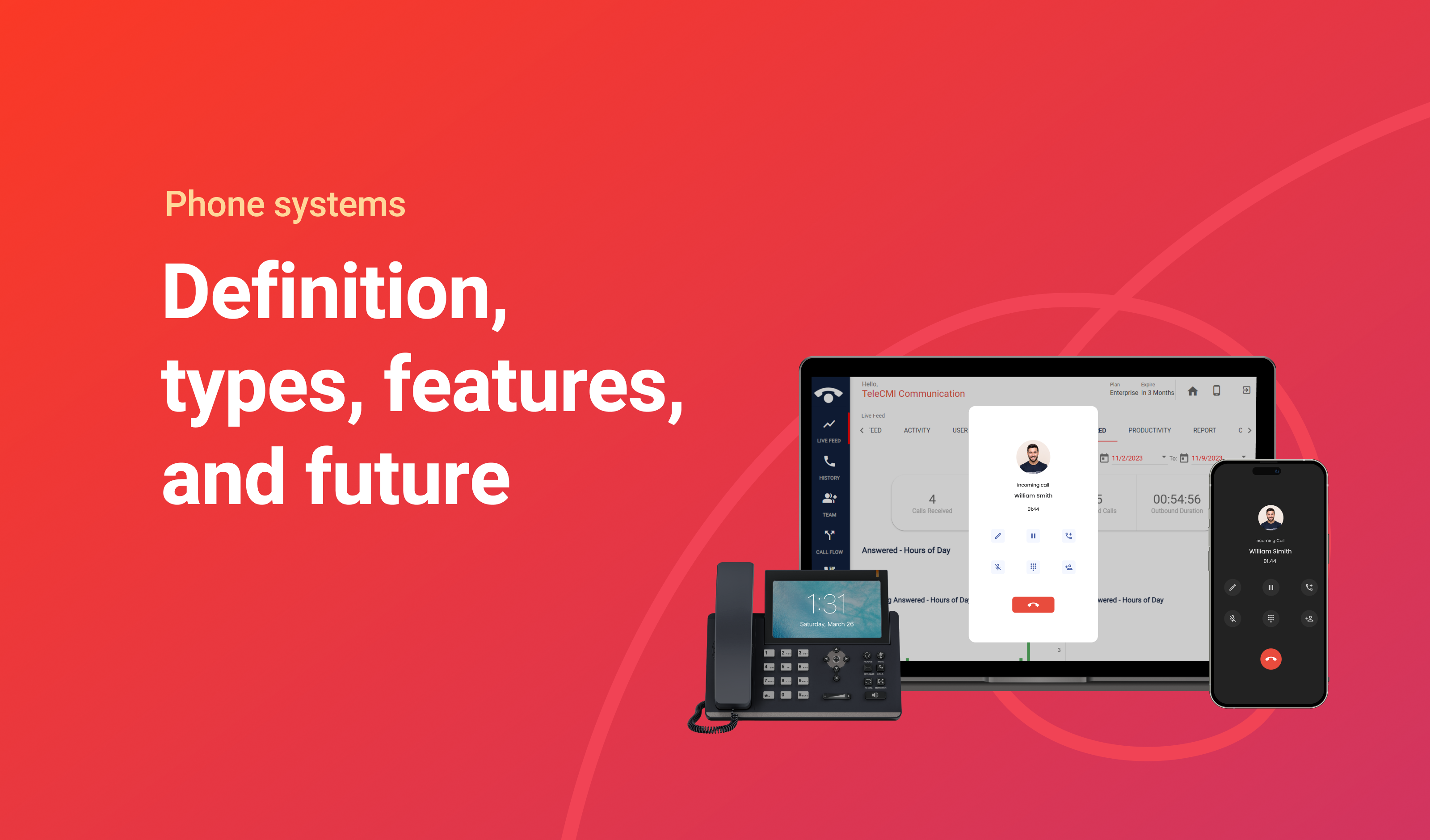
The world of communication is changing rapidly. There were good old days when we used landline phones to speak with others. This is not the case in the present scenario. With the internet everywhere, it is crucial for businesses to adopt the present trend and move with it to engage customers. Phone systems play a crucial role in customer experience as they deal with customers directly. In this blog, let us discuss the meaning of business phone systems, their type, features, and what we can expect in the future.
What is a Phone System?
A phone system is a communication medium that combines hardware and software to help members make and receive calls on either end. From residential systems to challenging corporate systems, a telephone system acts as the pillar of any business. It allows users to communicate with each other in real time and comes with multiple features, such as call recording, call conferencing, call queuing, call transfer, call forwarding, etc. There are different types of phone systems, and each works in a unique manner.
Types of Phone Systems for Business:
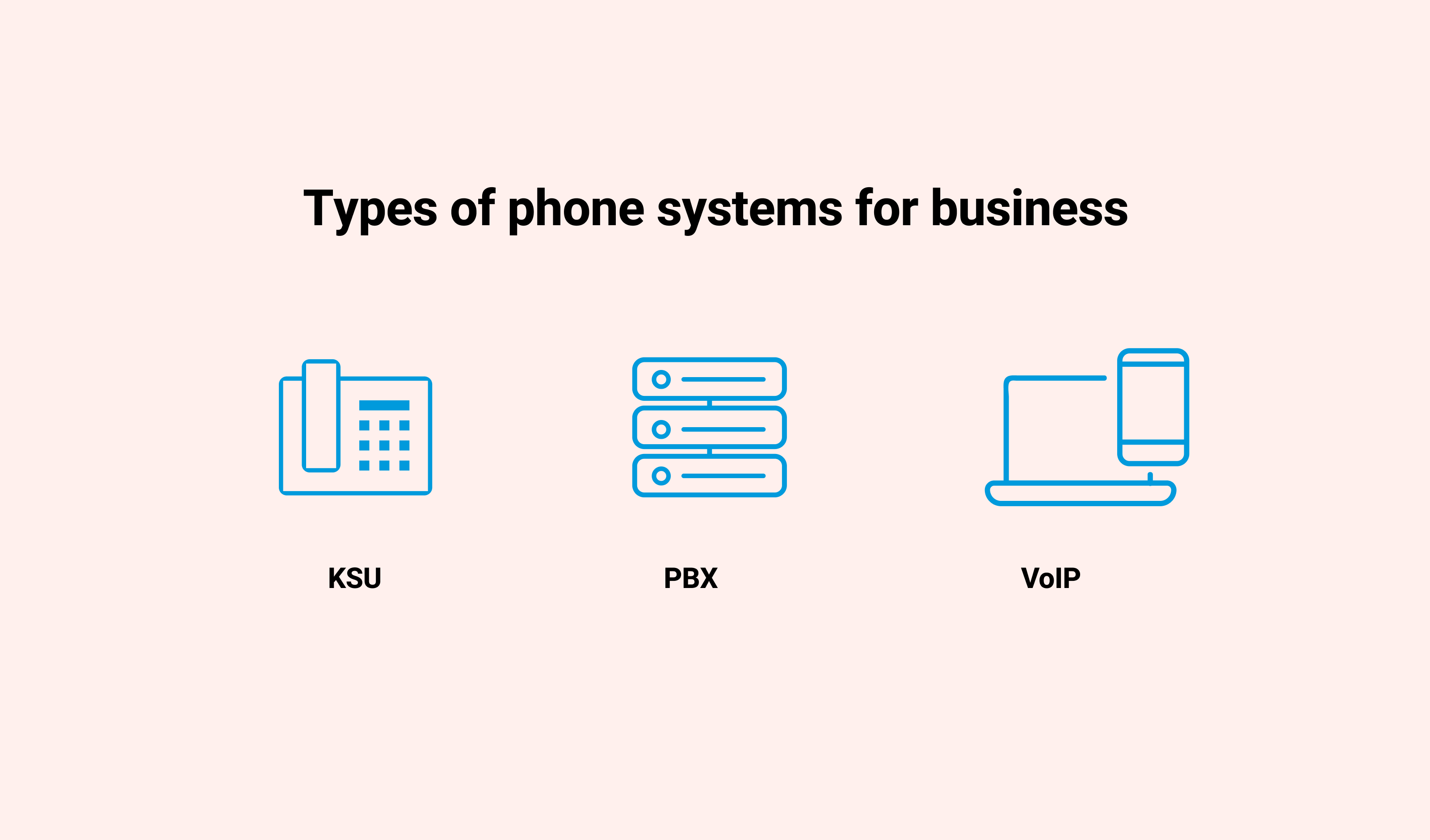
-
Key Service Utility (KSU)
Key System Units are the most traditional phone systems for businesses. These phones are the best options for small businesses since they limit the number of phone lines to be installed. However, they are not portable; hence, employees must be strictly available on the physical premises to speak to customers. These systems utilize a central switching device called KSU; this device will determine the phone-line selection manually. The only disadvantage is that it allows only a limited number of users and cannot be sold commercially. However, they are easy to use as home telephones.
An agent can simply pick up the phone and dial the number to place a call. KSU phone systems come with basic features such as on-hold, speakerphone, and intercom capabilities. These landline-based phone systems will need on-site hardware installation, setup, and maintenance, which can be expensive and time-consuming compared to the other phone systems. Hence, only a minimal number of modern businesses use them.
-
Private Branch Exchange (PBX)
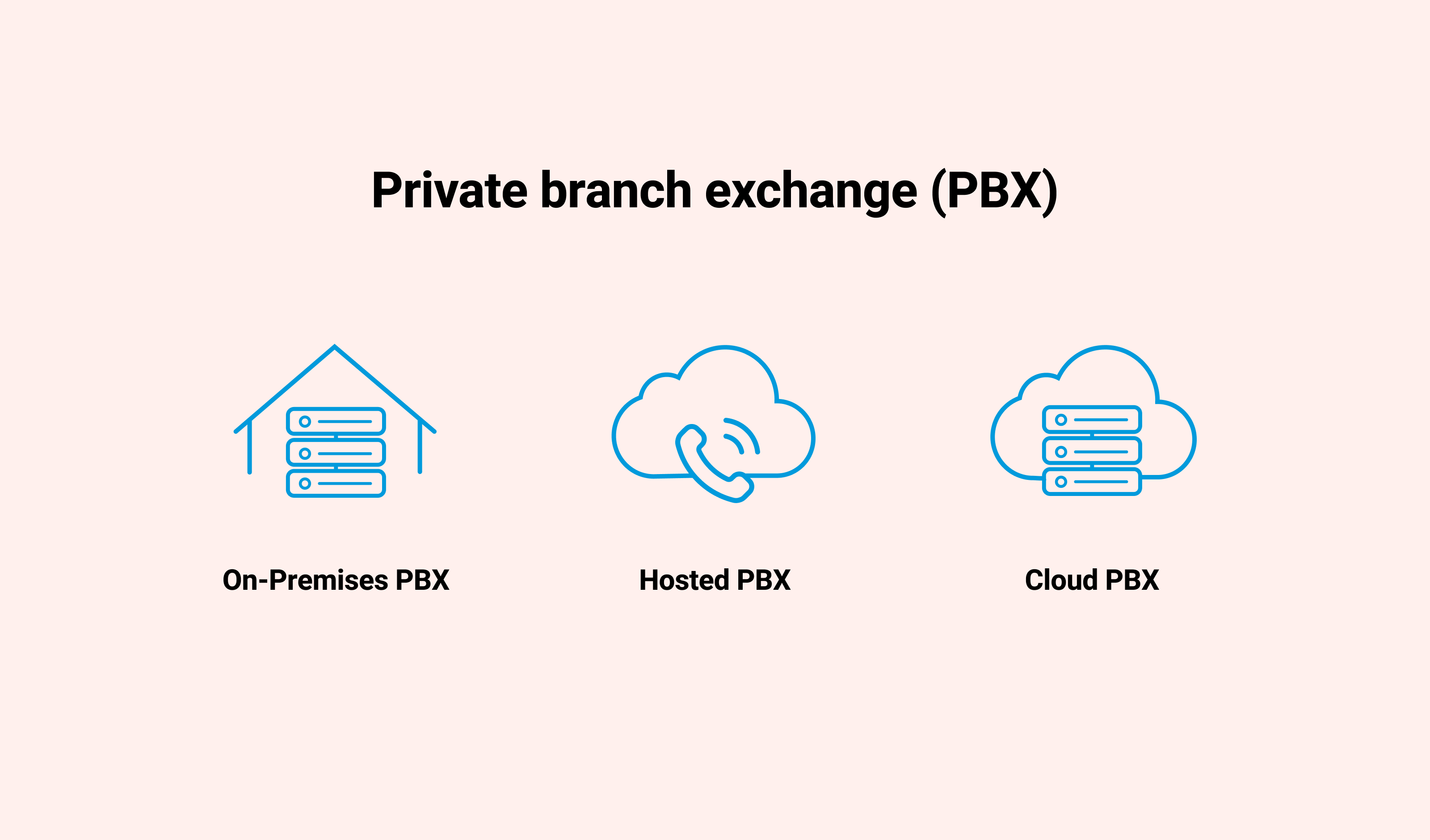
PBX Systems are the phone systems that offer connectivity within a company. This type of phone system handles routing and switching calls between the company and a telephone network. Although it is a private network, the telephone wires are connected to the Public Switched Telephone Network (PSTN) and divided into smaller and limited number of lines. The significant functionality of PBX phone systems includes handling inbound and outbound calls, call routing, call queuing, call conferencing, etc. PBX systems are categorized into three major types:
On-premise PBX Systems are an in-house communication system for managing incoming and outgoing calls. This traditional method has been used for generations and is generally an automatic version of a manual switchboard. They require an on-site server and manual wiring to every single business phone. Hence, it results in high upfront costs and maintenance activities.
A Hosted PBX can be a virtual PBX, cloud PBX, or IP PBX. It is often included as part of a single unified communication platform that helps connect and route internal and external lines in a single system. With a hosted PBX phone system, you can manage your employee’s phones from a web browser, mobile app, etc. Most IP PBX systems come with additional features such as call transfer, call recording, voicemail transcription, auto attendant, interactive voice response (IVR), call forwarding, etc.
A Cloud PBX is a type of hosted PBX system used by enterprise-level businesses. They are easy to set up and maintain as they are hosted on the cloud rather than an expensive infrastructure. The only need is for an active router with a steady internet connection to handle inbound and outbound communication. This is an ideal solution for businesses that have branches and customers all over the globe.
-
Voice over Internet Protocol (VoIP)
VoIP Phone Systems are a form of cloud PBX systems in which calls are made and received over an internet connection. These phones are an excellent way to communicate with customers and are best for businesses looking for minimal investment. Moreover, these phone systems come with high-end advanced features such as virtual phone numbers, IVR, Automatic Call Distribution (ACD), call barging, sticky agents, call transferring, call forwarding, call queuing, personalized greetings, setting up business hours, and much more.
Key features checklists for phone systems:
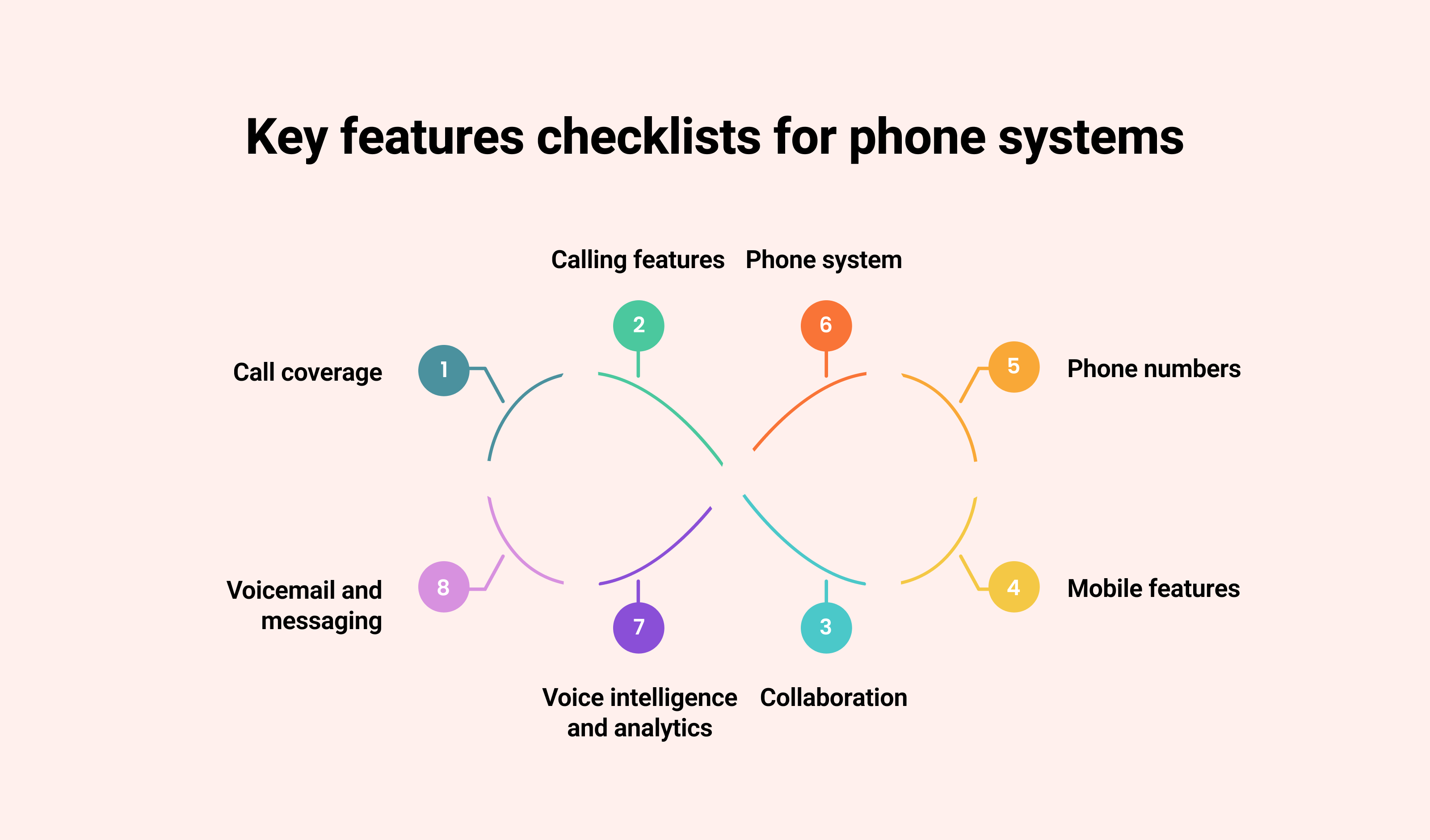
In some situations, agents may not be available to pick up the customer call when they are away from the desk or on leave. Call Coverage acts as a security pillar to rule out these issues. It also comes with many features, such as ACD, Auto Attendant, Call Forwarding, Callback, and Call Queuing. These features help eliminate the need to miss any leads.
Undoubtedly, phone systems come with high-end calling features to interact with customers efficiently. They also enable businesses to customize telephone systems to offer an enhanced customer experience. These advanced features include Auto Dialers, caller ID, Call Recording, Call Barging, and Sticky agents.
Also, phone systems allow businesses to connect with their employees and customers from anywhere, anytime, using a top-notch collaboration approach. They come with features such as video conferencing, email, screen sharing, webchats, file sharing, etc., to easily collaborate with internal and external teams.
Although most companies use traditional landline phone systems, the use of mobile devices in the workplace is increasing remote work. A business phone system is available as a mobile app on desktops, laptops, mobile devices, and tablets. It helps businesses promote a remote-friendly environment and can help employees connect promptly from anywhere in the world.
Phone numbers are the key players for businesses to connect with customers. Also, they establish your company’s presence and credibility. Different business phone numbers are available, such as toll-free, local, international, vanity, and virtual numbers. Businesses can consider the number that suits their needs.
As discussed, the Phone System Platform is a network of interconnected telephones. These phones are nothing but KSU, PBX, and VoIP Phone Systems. Depending on business requirements, these phones can be hosted, cloud, or on-premise. All these phone systems have end-to-end call management facilities, call conferencing, call recording, call forwarding, etc.
-
Voice Intelligence & Analytics
The Voice Intelligence feature helps one learn from the calls, with features such as call recording and other voice intelligence tools that can also analyze the customers' sentiments during the call. With this collected information, businesses can implement decision-making strategies.
Voicemail enables your callers to leave a message for employees or businesses when unavailable. This voicemail inbox can be accessed from any device from anywhere, including mobiles, tablets, desktops, and laptops. Employees can get back to them once they get to see it.
Industries that use a Phone System Solution:
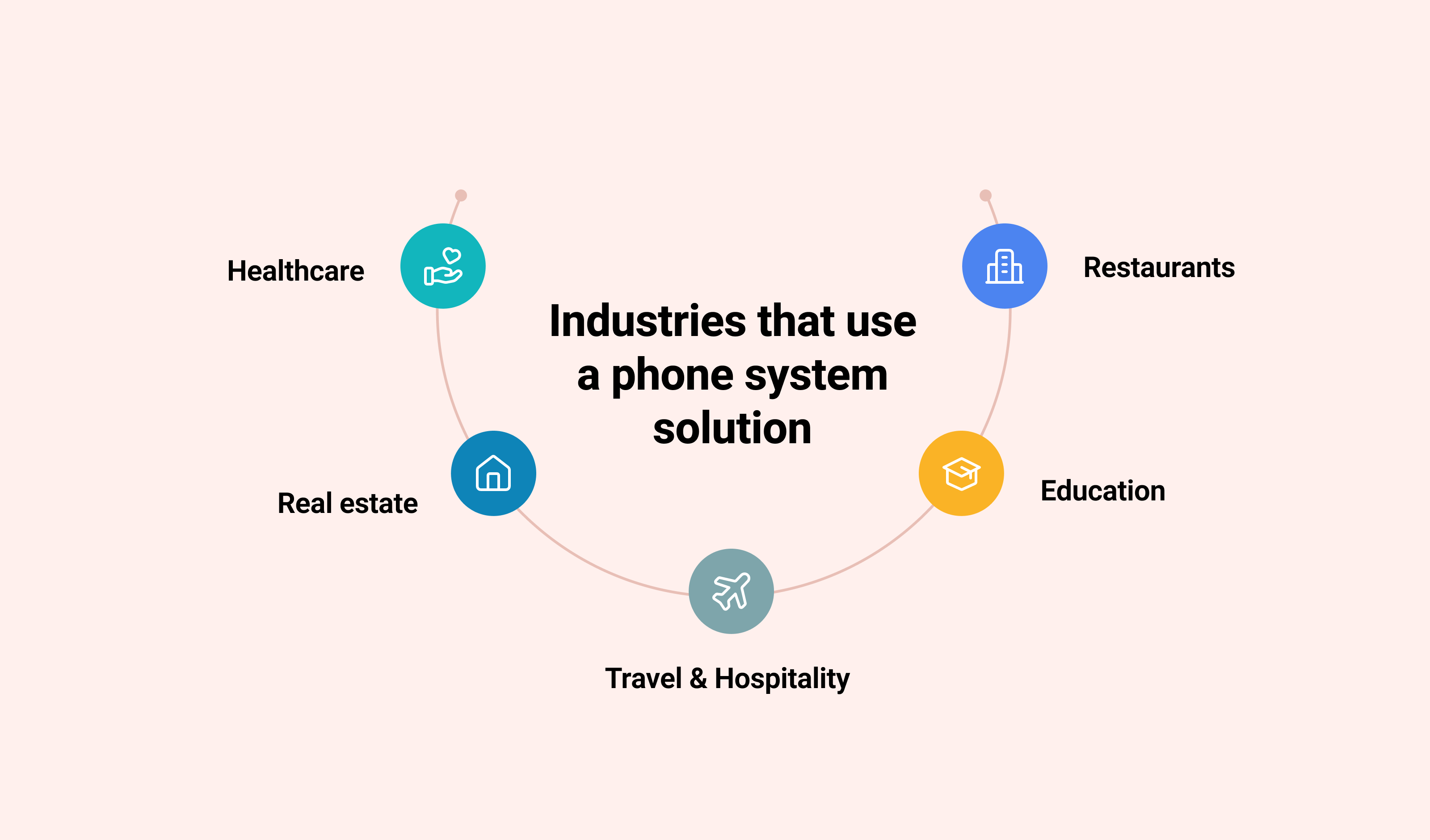
In Healthcare, Phone Systems are crucial for emergencies, booking appointments, tracking call activity, and other essential factors. A VoIP-based business phone system comes with a a CRM integration feature, where everything is collaborated in a unified environment.
Business phone services play a great role in the real estate sector by connecting customers, businesses, and intermediaries with a single click. Businesses can read transcribed voicemails, utilize call conferencing methods, transfer the call to the respective authorities, etc.
Travel and Hospitality is the sector that handles dozens of customer phone calls for booking, canceling rooms, checking for availability, etc. With a business phone system, these businesses can also track missed call activities, agent availability, calls per agent, etc.
Everything can now be done with a business phone service, from inquiry education to certification. One can easily connect in seconds with a high-end business phone system, whether a parent or a teacher.
Restaurants usually receive a lot of calls. Whether a customer makes a call to reserve a table or place a food order during business hours or for internal communication throughout the day and night, business phone systems are important.
Conclusion:
Phone Systems for businesses are an essential factor to be taken into consideration. It also resolves the pain points, identifies customer challenges, and provides unparalleled productivity without any doubts. If you are one such business looking to make a minimal investment, phone systems are some great options, and you can check with solution providers to get it done.




